Healthy Homemaking: A Good Egg
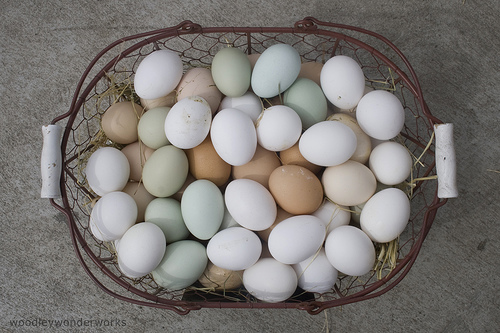
Image by wwworks
 Baby Step 7- A Good Egg
Baby Step 7- A Good Egg
What this baby step is all about:
To consider buying a higher quality of eggs than you are currently buying.
Why this step is important:
Eggs are powerhouses of nutrition; they are considered by many to be one of the most nutritionally dense foods out there. So, providing you or your family are not allergic to them (unfortunately, it can be a fairly common allergy or sensitivity), I would highly suggest adding them to your repertoire as much as possible!
Most commercial eggs come from hens that are cooped up indoors, with little to no ability to move around and get exercise, no fresh air, artificial light, a poor quality of nourishment (usually pesticide-laden grains and soy products), not to mention the fact that they are probably receiving antibiotics or other medications (to avoid the infections that frequently pass through chickens living in cramped conditions). Eggs coming from this unfortunate situation pale (literally!) in comparison to free-range eggs.
Hens who are able to roam around (free-range, free-run or cage-free are generally the terms used to denote this), to exercise, receive fresh air and sunlight, eat insects and other grub (a healthy part of a chicken's diet), and just plain old act like chickens, produce far superior eggs. They have higher omega 3 concentrations, higher levels of Vitamins A, E and beta-carotene, and are generally free of any toxins. The difference is actually quite notable, if you compare a conventional egg with one that is free-range and/or organic– the yolk in a healthy egg is a lovely, bright yellowy-orange color, and stands out visibly next to the pale, sick-looking yolk of your basic grocery store egg.
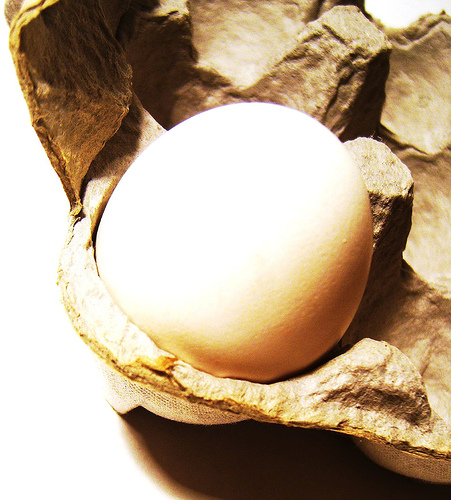
Image by darwinbell
How to get started with this step:
There are a few terms you should know, which will help you to know what you are looking for, and what to avoid.
Omega-3 Eggs: This has become a trendy type of egg on the market in the last several years. Although it sounds so promising at first, these eggs are still not free-range, and in fact, their Omega-3 does not come from a natural diet, but rather a supplemented diet, that still generally contains the same grains, as well as soy, with added flax seed. I wouldn’t consider them a great choice, considering what the hens are fed, unless your only other option is conventional.
Free-Range (free-run or cage-free): This is an excellent choice. Although these eggs are not able to be certified organic, they are the closest you can get to that kind of quality without the price. They will have all of the above benefits mentioned, except that (unless specified) they could still be exposed to unwanted things such as antibiotics (though this is less common), pesticides, etc.
Organic: Obviously, these eggs should be of the highest quality and I would definitely recommend them. My only concern would be that you ensure that they clearly state that the birds are free-range, as it is possible to raise “organic” eggs, without allowing the hens full roaming ability, and feeding them a diet based mostly on organic grains or soy.
Farm fresh, free-range: This would be my top choice. If you can find a local farm (hobby or otherwise) that raises chickens as I mentioned above, does not use any medications or sprays on their farm, etc. I would snap those eggs up in a heartbeat! Establish a good relationship with the farmer and become a regular customer!
Online Resources:
The Nourishing Gourmet- Free Range vs. Commercial Eggs and Eggs: A Powerhouse of Nutrition
The Chicken and Egg Page (some good research on the benefits of free-range eggs)
Reading Resources:
Nourishing Traditions
– Much excellent information on including eggs in a healthy diet (addressing the issues of cholesterol and fats especially, plus lots of wonderful recipes using eggs).
 Taken from the eBook Healthy Homemaking: One Step at a Time.
Taken from the eBook Healthy Homemaking: One Step at a Time.

What type of eggs do you buy? Where do you get them from? Have you changed your egg buying habits in recent years?


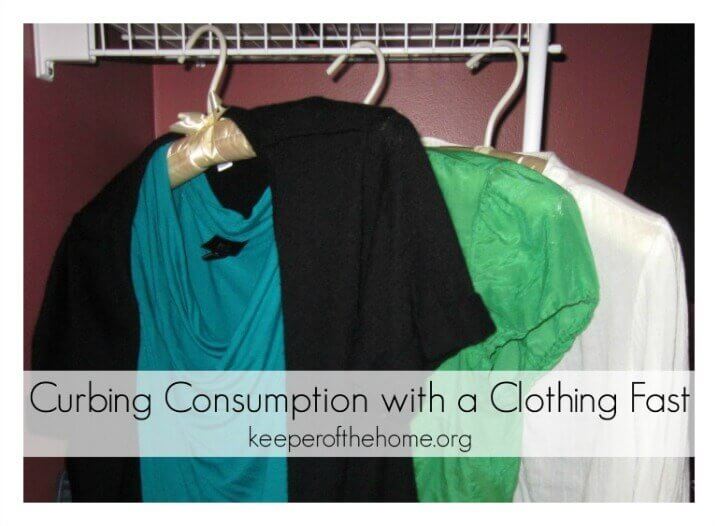

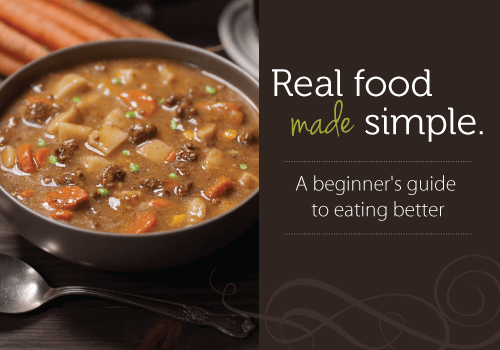
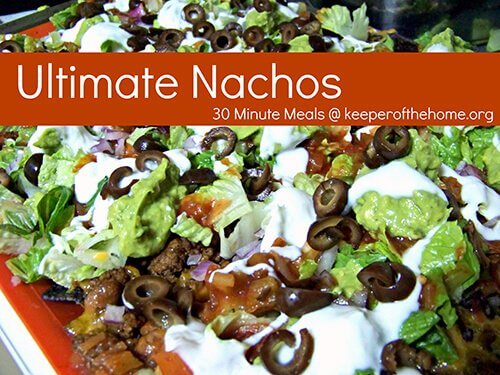
I buy local farm fresh, free range eggs from either our local co-op or grocery store. We live in Amish country, so a lot of Amish sell their eggs to the grocer. I haven’t actually met our producer, but I do know that it’s a family own/run farm. During the summer I try to buy from the farmer’s market.
That sounds like a great option, Sarah! I personally buy mine from an organic egg farm, run by friends of ours. We’ve visited there several times and have seen the chickens roaming their large yard freely, so I feel comfortable with what we are getting. I buy his seconds (the eggs not perfect looking enough to go to the store), for $5 a flat (2 1/2 dozen), which I think is a steal! Except that every spring, they switch chickens and have no eggs to sell us for about 2 months, but maybe I will try the farmer’s market this year to fill in that gap.
I am so lucky that my PARENTS have chickens! Even though they live 3 hours away, they are down here quite a bit and I always get a dozen or 2 eggs. Once you eat them, regular eggs taste so bland!
I’m still trying to find a good source for eggs. Ideally, I’d like to have chickens in our yard. But I don’t know if that’s allowed in the city limits. Or, I would like to find a local farm to buy eggs from directly so I can see for myself the chickens are allowed to roam free and also inquire about their feed. Right now, I’m buying eggs from our local health food store which buys them from a local family farm. According to the health food store, the chickens are given no antibotics (which isn’t allowed in poultry anyway I believe), have no animal by-products in their feed and have cage free housing.
I just wish the labels on eggs actually meant what they said. From what I’ve read, free range just means “access” to outdoors. And doesn’t imply the animals are treated humanely either.
This subject was so interesting when I saw one egg that was a regular store bought egg cracked open in a dish next to a farm fresh free range egg in a dish. The difference in the color of yolk was incredible. The former egg was pale and small. The latter egg was bright, big, and beautiful.
Thank you for sharing this part of your book:)
Great post, Stephanie! In California, free range organic eggs cost upwards of $4 a dozen. (Reg. white eggs are over $2.50). I really encourage your readers to consider raising chickens in their own back yard. Most cities will allow you to do so provided you obey zoning rules that limit the number of hens, etc.
Unlike some farm animals, chickens are VERY easy to raise and their droppings make for great fertilizer in your veggie garden. You don’t need a bunch of hens and if you stagger their ages, new hens will lay for their first year when older chickens stop to molt. (You must introduce new chicks into the flock only when fully grown – just keep them separate until old enough). You can read some of my posts on raising chickens at
http://riverrockcottage.blogspot.com/search/label/Keeping%20Chickens
Mary Ellen and Cottage Comtesse, thanks for bringing up the subject of backyard chickens. This is a direction that I would LOVE to move in, but unfortunately our city bylaws prevent it. Vancouver city has recently changed their bylaws to allow a certain number of backyard hens, but our suburb of Vancouver still limits it to those who live on lots over 1 acre. 🙁 I love to hear of more and more people doing this, though!
So lovely to disover your blog and a wonderful post on eggs this morning. I thought I’d share are eggsperience. We free-range 50 hens who have access to pature, bugs, natural sunlight etc. And they are happy except for the terror they experience almost daily from racoons, eagles and the most ravenous, ravens who we’ve lost 12 chickens to this month. We have tried everything and as this flock quickly dwindles, that will be it for us and hens until we figure out how to keep them ‘out’ and safe. Our eggs are in big demand in the neighbourhood as most farmers gave up flocks due to same problems. We sell for $4/dz. Just finished our taxes and indeed, over the year we cleared less than $400 on egg sales. Worth our time and labour? No, not econmically and the costs are starting to outweigh the benefits as we compost carcass after carcass. But all to say, local free range is by the far the best but consumers must be willing to pay. Our grocery store sells free range for $5/dz. And these eggs would be in the quota system where the farmer is making a guaranteed profit. Some of our customers “complain” about our $4 dz. I just to smile and keep the thought ” we make NOTHING on these eggs” to myself. All to say a backyard flock is the best way to go. Many municipalities allow it and if they don’t, it is absolutely worth campaigning for it. Eggs are excellent food and your own are phenomenal.
I’ve been trying over the past few years to get better eggs but its sort of an up and down thing…for a while we could but then they were unreliable, etc. We try to buy the best we can, but I recently thought about trying, once again, to find another source. Its so hard. The free run eggs in my store are almost the same price as organic, which only the PC brand are available, which are not stated as free run. They are about $6 per dozen, which we cannot afford at all. So I will keep looking. For now I am buying eggs from a farmer that sells to the local store for about $2.25 that are free run but not organic. However they are not free run in the winter as its way too cold here.
Ah, to raise your own chickens would be awesome. However, I am an avid dog lover and can’t imagine our family without a dog (we usually have Golden Retrievers). Which means, I can’t imagine our family raising chickens. I’m sure it could be done, but at the same time, our last dog was quite the hunter and killed a lot of our old neighbor’s ducks.
I was going to raise chickens- for eggs but my intial look up of city codes doesn’t allow me to but I’ll give a call just to be sure.
Otherwise I am close enough to a nursery and several farms that sell eggs which I will happily buy.
I love eggs… Trying to figure out a cheeseless/milkless quiche that I could make- any suggestions?
We are currently in the process of building our chicken coop and hope to have chicks in a few weeks! We have been buying eggs from another family for awhile now and can’t wait to have our own. There really is no comparison – fresh eggs from healthy, free range chickens are a treat worth finding!
THIS IS SO TRUE! After such a long time of eating organic, free-range eggs I almost gagged when I ate a left-over store bought egg my son brought home from Easter! YUK! I will pay a few bucks more every week to avoid THAt! Great post!
love this article. Many years ago we went and visited a farm ran by a home school family. They had their chickens out in the pasture but contained in a fence and they moved the fencing ever few days. They were saying to be careful with “free range” eggs in a store because the guidelines were so loose on this that to qualify for free range meant the farmer only had to give there chickens the ability to get up out of their nesting boxes and move around even if it is only on concrete. I am not sure if the definition has since then been better legally defined.
Move forward nearly ten years and we have our own farm and our own free range chickens. They have a coop they go in at night (for several months we locked them in at night and let them out in the morning. Now the door to the coop stays open 24/7 and they run free on 5 acres. There is no comparison in taste. We sell our eggs locally and our customers have become very loyal.
I recommend http://www.localharvest.org to find local farms to meet your needs. While it is not a comprehensive list, it is a starting place.
Sarah, our Golden Retriever has never harmed a chicken, in fact they walk all around her, sun with her, etc. I realize not every dog will do this, but if you know your dog and introduce the chickens carefully, it can work. Now she thinks she is their protector. Kind of reminds me of Nana in Peter Pan.
You are so correct about the benefits of better eggs. My mother has chickens and sells her eggs to local restaurants and the community. They are fabulous! I never believed there would be difference in eggs, but there really is!